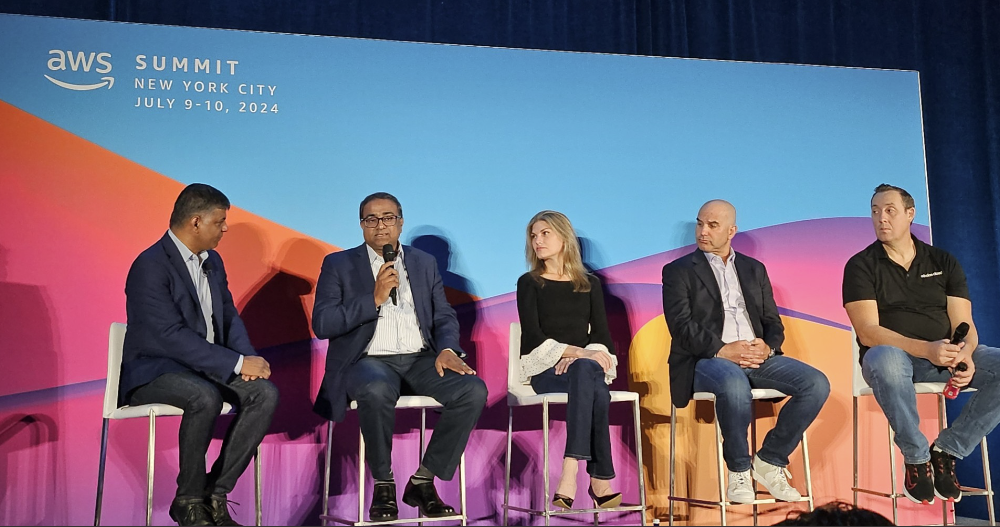Enterprises have thousands of use cases for generative AI and are now working through prioritizing them and ultimately moving to production.
At AWS Summit 2024 in New York, a panel of partners and integrators talked about Amazon Q early adoption and genAI use cases with a focus on pilots to production.
The big takeaway is that the experimentation phase is over, but companies have thousands of use cases to prioritize. General themes are horizontal functions, industry focus, IT, code and anything focused on productivity. Integrators are now working toward vertical adoption of generative AI.
Indeed, those use cases--especially industry-focused efforts-- are behind a multi-year partnership between AWS and Deloitte create a genAI innovation lab. The two companies are designed to move generative AI pilots to production. The effort is aligned to Deloitte’s IndustryAdvantage initiative, a strategic $2 billion investment to co-innovate with eligible clients and alliances to develop industry-focused solutions. ”For instance, Deloitte's lab is developing an AI suite designed for CFOs. Deloitte and AWS will combine various services to focus on industry use cases leveraging Amazon SageMaker, Bedrock, Q and Braket.
TCS Krishna Mohan, VP and Deputy Head of TCS' AI and Cloud unit, said the focus is on prioritizing use cases to deploy. Enterprises went to line of business to collect use cases and came back with thousands.
"A lot of customers have 3,000 to 4,000 use cases. They went to line of business heads and asked for use cases. Every line of business leader had a budget and the central organization also had budget," said Mohan. "Now the focus is on prioritizing them and how to deploy into production."
- Research: Return on Transformation Investments (RTI)
- 14 takeaways from genAI initiatives midway through 2024
- Don't forget the non-technical, human costs to generative AI projects
- GenAI boom eludes enterprise software...for now
- Copilot, genAI agent implementations are about to get complicated
Mohan said use cases that deliver on productivity metrics win out. Use cases that are horizontal across functions, industry focused and make it easier on compliance are winning out, he added. Key use cases include IT productivity, sales, marketing, finance, HR, customer segmentation in retail, automation in manufacturing, and customer experience in airlines.
Stephanie Pace, Global AI/ML GTM leader at Quantiphi, said the genAI market is segmenting between enterprises builders and buyers. Companies looking for faster time to value, said Stephanie Pace, Global AI/ML GTM leader at Quantiphi. Pace said Quantiphi was an Amazon Q pilot customer and has found it helpful to deliver faster time to value.
According to Pace, genAI budgets and decision making are more aligned with the line of business. The genAI buying table now includes IT, compliance and line of business. "We saw pilots not move into production because compliance wasn't in the room," said Pace. "Projects are now focused less on the art of the possible and more on the art of the profitable."
The biggest challenge for moving genAI to production is enterprise cloud and data maturity. Not all companies are ready for genAI due to data strategies being immature, said AllCloud CEO Eran Gil.
Dr. Ryan Ries, Chief Data Strategist at Mission Cloud, said genAI requires the correct data schema to use natural language processing. "You have to go through and clean up these systems so the data being captured is accurate and available for use," said Ries. "Companies moved toward having the best data lake ever without doing the groundwork."
Generative AI's looming crap in, crap out data problem
Constellation Research CEO Ray Wang said:
"Many projects will remain in POC phase as clients grapple with how much data they need to deliver on a precision that their customers will trust, where will they partner for data, and who do they sue when something goes wrong? That being said, the customers that know when and where to insert a human into the process are the customers that will win in the Age of AI."
Other takeaways include:
- Mohan said manufacturing is adopting genAI quickly as are regulated industries.
- Implementations of genAI can be challenging due to integration, people and processes. The big lesson is that genAI by itself doesn't cure anything by itself.
- Sales productivity has been a big use case by democratizing information and surfacing the data that improves efficiency. Pace said customers have used Amazon Q to surface insights, in-stock inventory and order information. "We have explored sales productivity and driving revenue with customers," said Pace.
- Recruiting was another key use cases, said Ries. GenAI is being used to comb through candidates, create questions and prevent bias.
- There's a lot of plumbing work that is required to move genAI into production.
- Data sources and IP issues typically require enterprises to build more genAI integrations and customize. "Everybody is worried about IP and their data going out," said Mohan.
- Mohan said enterprises need to focus on business use cases and value over what technology is being used. Mohan said he expected the next two to three quarters will sort out the business value of genAI and more best practices.
- Enterprises are seeing cost improvements with genAI due to model improvements as well as compute efficiency. New tooling is also helping improve costs.
More on genAI dynamics:
- 14 takeaways from genAI initiatives midway through 2024
- OpenAI and Microsoft: Symbiotic or future frenemies?
- AI infrastructure is the new innovation hotbed with smartphone-like release cadence
- Don't forget the non-technical, human costs to generative AI projects
- GenAI boom eludes enterprise software...for now
- The real reason Windows AI PCs will be interesting
- Copilot, genAI agent implementations are about to get complicated
- Generative AI spending will move beyond the IT budget
- Enterprises Must Now Cultivate a Capable and Diverse AI Model Garden
- Financial services firms see genAI use cases leading to efficiency boom


